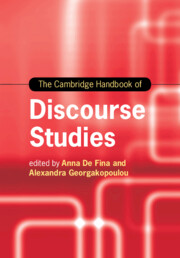Book contents
- The Cambridge Handbook of Discourse Studies
- Cambridge Handbooks in Language and Linguistics
- The Cambridge Handbook of Discourse Studies
- Copyright page
- Contents
- Figures
- Tables
- Contributors
- Preface
- Part I (Con)Textualizing Discourses
- Part II Perspectives and Modes of Analysis
- Part III Discourse Materialities and Embodiment
- Part IV (Trans)Locations and Intersections
- Part V Ethics, Inequality and Inclusion
- Part VI Discourses, Publics and Mediatization
- 27 The Critical Analysis of Genre and Social Action
- 28 Rhetorics, Discourse and Populist Politics
- 29 The Discourses of Money and the Economy
- 30 Corporate Discourse
- 31 Mediatized Communication and Linguistic Reflexivity in Contemporary Public and Political Life
- 32 Discourse Analysis and Digital Surveillance
- Index
- References
28 - Rhetorics, Discourse and Populist Politics
from Part VI - Discourses, Publics and Mediatization
Published online by Cambridge University Press: 28 September 2020
- The Cambridge Handbook of Discourse Studies
- Cambridge Handbooks in Language and Linguistics
- The Cambridge Handbook of Discourse Studies
- Copyright page
- Contents
- Figures
- Tables
- Contributors
- Preface
- Part I (Con)Textualizing Discourses
- Part II Perspectives and Modes of Analysis
- Part III Discourse Materialities and Embodiment
- Part IV (Trans)Locations and Intersections
- Part V Ethics, Inequality and Inclusion
- Part VI Discourses, Publics and Mediatization
- 27 The Critical Analysis of Genre and Social Action
- 28 Rhetorics, Discourse and Populist Politics
- 29 The Discourses of Money and the Economy
- 30 Corporate Discourse
- 31 Mediatized Communication and Linguistic Reflexivity in Contemporary Public and Political Life
- 32 Discourse Analysis and Digital Surveillance
- Index
- References
Summary
Although the notion of “populism” goes back to Roman/Greek antiquity, the twenty-first century has seen a surge in both the success of such movements and academic interest in them, especially their rhetorics, discourse and politics. In engaging with populism, discourse studies has interfaced with political and social sciences and struggled to find a conceptually sound and empirically grounded definition, while avoiding an overly broad use of the term. In this, the field is far from homogenous, but it offers many insightful approaches to studying contemporary populist politics. A specific point of interest (and contention) is the interrelationships among rhetorical strategies, discourse-analytical concepts relating populism to hegemony or society (such as interdiscursivity, recontextualization and normalization) and the agenda of populist politics. Behind this looms the larger question of the status of populism itself. While some scholars regard populism as an ideology, others call it a movement or syndrome. While some argue that it is both a form and a content, others maintain that it is only a style or, rather, that it combines specific forms with specific contents. In terms of evaluation, some argue that (at least contemporary) populism is a danger to democracy or, more specifically, to liberal democracy, while others see it as an integral part of any democracy or even a positive force. Central among the traits identified in populist politics is its divisiveness and appeal to “the people”: It divides society into two homogenous and antagonistic camps, the “pure people” versus the “corrupt elite.” At the same time, it is antipluralist in claiming that it alone represents the true will of the people, claiming to raise that will over all else. This often links to a larger opposition constructed by populist politics: “national” versus “international” interests. Beyond such commonalities, populist politics, their rhetorics and discourse differ strikingly across the globe and across political affiliations. Empirical discourse studies engage with the specifics of the rhetorics employed by populist politics and how they relate to discourses within the respective contexts.
Keywords
- Type
- Chapter
- Information
- The Cambridge Handbook of Discourse Studies , pp. 622 - 643Publisher: Cambridge University PressPrint publication year: 2020
References
Further Reading
This edited volume’s insightful contributions on the forms and effects of populism across the globe remain relevant to this day.
Moffitt’s book makes a strong case for taking a close look at the performative dimension of populism, in particular the performances of its leaders in relation to crises and the media.
This aptly named introduction manages to give a comprehensive overview of populism across time and space in all its varied forms, providing a concise framework for comparative studies of populism.
This concise work, first published in 2016 and updated a year later, provides an accessible and passionate discussion of contemporary populism, focusing on its inner logic and threat to democracy.
This special issue covers right-wing populism in Europe and the United States and brings together varied approaches from applied linguistics and social sciences.
References
- 3
- Cited by



